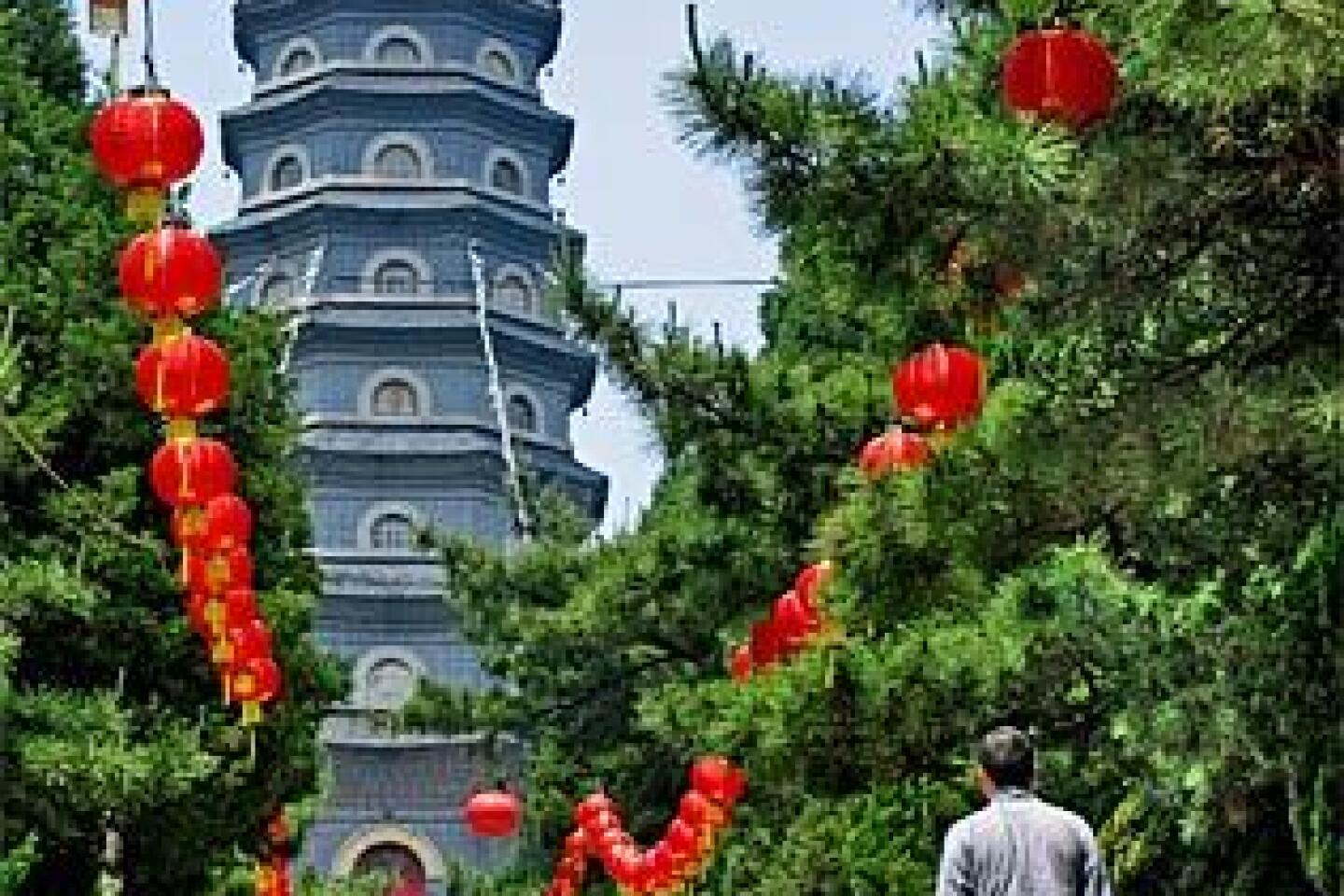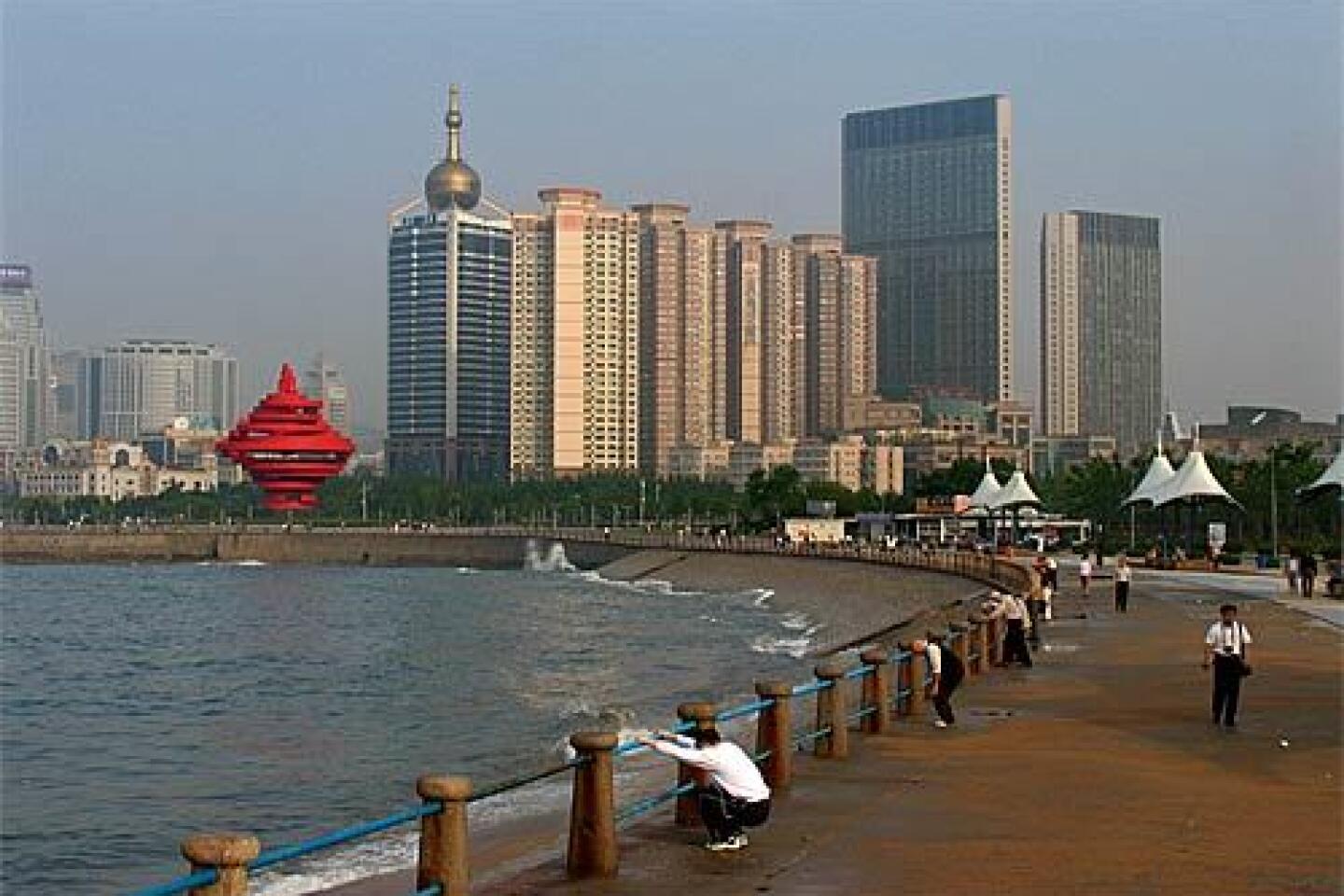Qingdao, China -- a six-pack of surprises
- Share via
Qingdao, China
I had been trying to learn Mandarin at Beijing Language and Culture University and still had about 3,500 Chinese characters to memorize with two months left in the semester. It was going slowly and, often, not well. So, taking a note from American college students, I packed my bathing suit, flip-flops and a mystery novel and came to Qingdao for spring break.
Millions of Chinese sun-seekers annually visit Qingdao, the beach capital of northern China. It occupies a hilly peninsula on the eastern coast of the mainland that meets the Yellow Sea in a series of stunning bays. Olympic yachting events will take place here this summer, but that’s not the only thing that makes Qingdao famous. Formerly known as Tsingtao, the city gave its name to the beer that is still bottled at a historic brewery here.
Beer and beach. That’s about all I knew about Qingdao. But maybe that’s not so bad. When you start with no preconceptions, everything surprises.
The first one was my guide, Mr. Yang, who picked me up at the airport and give me a daylong city tour. He had the pink face of a cherub and was a devout Christian in a country with an atheistic government.
On the way to the Huanghai Hotel, Mr. Yang pointed out fancy housing developments that have sprouted in the wetlands on Jiaozhou Bay, west of Qingdao, the city’s new sports stadium and Super Seafood, a 10-floor fish restaurant as big as a department store.
The Huanghai was a modern high-rise building with a vast, empty lobby. The government rates the hotel as three stars, and it was slated to get a fourth, according to the brochure, although I can’t think of a reason it deserved to.
My room had the clean, cheap and cheerful character of a Days Inn. The air-conditioning hadn’t been turned on yet because it was too early in the season, the front desk told me -- never mind that it was steamy -- and an odor of insecticide permeated.
The next morning I found Mr. Yang and Mr. Zhang, our white-gloved driver, waiting in the lobby to begin my city tour.
Qingdao was little more than a village in the late 19th century when the great powers of Europe began grabbing territory in China. Germany claimed Qingdao and turned it into a modern seaport, erecting government buildings, churches and villas that wouldn’t look out of place in Hamburg, Germany. The German imprint unfolds like an architectural handbook of the building styles popular in Europe during the first part of the 20th century.
On wide, sycamore-lined Daxue Road, we passed the Qingdao Art Museum in an eclectic-style building with Roman columns and an Art Deco roof line, then passed the old Japanese Middle School, a handsome Art Nouveau structure now part of Ocean University of China, the country’s foremost center for the study of marine sciences.
In the Badaguan neighborhood, once a leafy enclave for European merchants and officials, I saw Renaissance Revival facades, Victorian gingerbread, Art Nouveau grillwork, half-timbered.
From Badaguan to neighboring Fushan Bay, colonial architecture yields to the skyscrapers of the central business district, with its banks, apartment complexes and plush, international hotels. Wide open and undeveloped a decade ago, Fushan Bay now has the look of a modern Pacific Rim city, like a Seattle.
A long esplanade leads down to May 4th Square, a red metal sculpture shaped like a whirling top, the waterfront greenbelt and the Olympic yachting center.
Sailing is just beginning to catch on in China, and Qingdao has only one yacht club. Dean Brenner, chairman of the U.S. Olympic Sailing Committee, later told me that China has expended considerable effort and resources to develop the sport, with modest success. “But the winds are very light in Qingdao, and that makes it a challenging venue,” he said.
That day, there wasn’t a wisp of breeze or a boat on the water. So, I had to imagine how Fushan Bay would look this summer, skimmed by Olympic sails.
Heading northeast, my guides and I passed one long beach after another with changing huts and boardwalks, all empty under a dull sky. Wooden fishing boats moored in inlets rocked gently with the tide, their catch -- cuttlefish, whelks, slugs, snails and a whole, strange bestiary of crustaceans -- swimming in basins outside nearby seafood joints.
Beyond Shi Laoren, or Old Man Rock, the city thins out as the Laoshan Mountain reach the sea in precipitous cliffs, boulder heaps and crevices giving toeholds to gnarled pines. Celebrated in classical poetry and scroll painting, the coast north of Qingdao attracted sages of Taoism, an ancient faith inspired by nature.
After that, Mr. Yang took me to the old stone Tsingtao brewery in the heart of old Qingdao, where there’s a museum and tasting room. The Germans started it in 1903 chiefly to slake the thirst of their sailors and soldiers. They imported turn-of-the-last-century machinery, plus ingredients and recipes from the homeland and put the landmark Qingdao Bay pagoda on the label.
At a time when men wore long pigtails and women bound their feet, beer was virtually unknown in China. Now, Tsingtao -- partly owned by Anheuser-Busch -- is the No. 1 brew in the country.
We ordered several big green bottles to go with lunch at a seafood restaurant near my hotel. I had mine with ice, the only way I know to get cold beer in China.
I parted ways with the delightful Mr. Yang after that because I planned to spend my last few days in Qingdao on the beach. But first, he wrote down the names of other attractions in Chinese, so I could get around on my own.
One place on his list was Qingdao’s landmark Protestant Church. I went there the next morning, more for the architecture than the worship service. It’s a beautiful example of the folksy Art Nouveau style known as Jugendstil in Germany. It has a baby blue steeple and a granite cornerstone, dated 1908.
When I reached the courtyard, I was amazed to find people crowded around the entrance watching the service on TV monitors.
Inside the white-walled sanctuary, it was standing room only. I had never seen such a packed church, even on Christmas morning in America -- suggesting that Christianity is making a comeback in China. Recently, the China Christian Council reported that more than 16 million Protestants live in China, 6 million more than a decade ago.
I found a place to stand in the vestibule, and then saw Mr. Yang several pews in front of me. Raised Lutheran, I was deeply moved when the congregation began reciting the Nicene Creed in Chinese, which I recognized by the cadence.
The sun tried to come out during the benediction. Otherwise, nothing about that muggy May Sunday attracted me to the beach. So I wandered in the neighborhood around the church, passing vintage European houses that must have once been showplaces. A few were encased in scaffolding, hinting at new life for the historic district.
My steps took me to the twin-towered Romanesque St. Michael’s Cathedral and the magisterial Headquarters of the German Administration, completed in 1914. Then I rambled down to Qingdao Bay, where the two-tiered pagoda at the end of long Zhanqiao Pier came as no surprise. I’d already seen it on Tsingtao labels.
The pier was packed with tourists taking pictures. A few stalwarts sat under umbrellas, pining for sunshine, or scavenged for cockles and mussels on the pebbled beach. Others walked along the waterfront promenade.
China was once a maritime power, with fleets that ventured into the Pacific and Indian oceans. But you wouldn’t know it from the dilapidated naval museum, in a compound that looks like an old Bavarian hunting lodge. It has musty historical displays without English captions and a collection of vessels including the rusty, Soviet-made destroyer Anshan. Then I packed my bags and moved to the Shangri-La Hotel on Fushan Bay, for the last two nights of my stay.
Compared with the Huanghai (and my dorm room in Beijing), the Shangri-La was terrific. It had cappuccino, air conditioning, an English-speaking staff, rooms with satellite TV and picture windows.
But sadly, when I opened the curtains the next morning, I couldn’t see anything. Qingdao was cloaked in fog, later broken by torrential rain. Even so, I went walking in the Badaguan area in a downpour while my umbrella turned inside out and my feet got soaked.
My stay in Qingdao was no spring break in Miami Beach. But hearing the Nicene Creed in Chinese, prying open Yellow Sea clams and walking in the rain in Badaguan were worth more to me than a suntan.
susan.spano@latimes.com
More to Read
Sign up for The Wild
We’ll help you find the best places to hike, bike and run, as well as the perfect silent spots for meditation and yoga.
You may occasionally receive promotional content from the Los Angeles Times.











